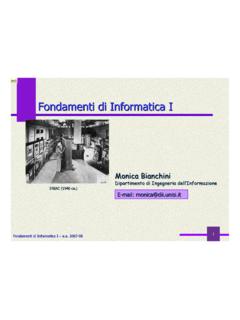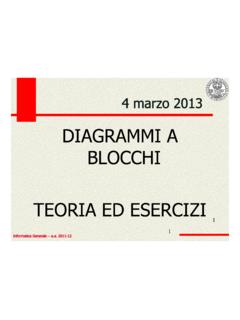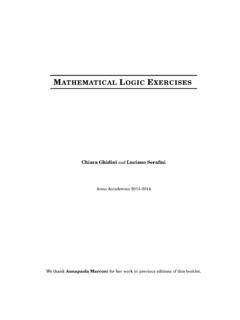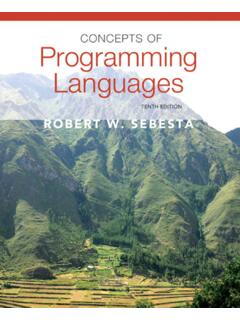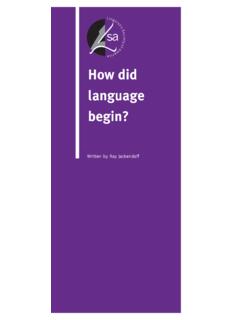Transcription of MATHEMATICAL LOGIC EXERCISES - UniTrento
1 MATHEMATICALLOGICEXERCISESC hiara GhidiniandLuciano SerafiniAnno Accademico 2013-2014We thankAnnapaola Marconifor her work in previous editions of this should be made as simple as possible,but not s Digest. Oct. 1977 Albert EinsteinContents1 Introduction32 Propositional Basic Concepts .. Truth Tables .. Propositional Formalization .. Formalizing Simple Sentences .. Formalizing Problems .. Normal Form Reduction ..283 First Order Basic Concepts .. FOL Formalization ..354 Modal Basic Concepts .. Satisfiability and Validity .. Modal LOGIC Formalization ..761 Mathematics is the onlyinstructional material that canbe presented in an entirelyundogmatic MathematicalIntelligencer, v.
2 5, no. 2, 1983 MAXDEHNC hapter 1 IntroductionThe purpose of this booklet is to give you a number of EXERCISES on proposi-tional, first order and modal logics to complement the topics and exercisescovered during the lectures of the course onmathematical LOGIC . The mate-rial presented here is not a direct component of the course but is offered toyou as an incentive and a support to understand and master the concepts andexercises presented during the Trivial Easy Medium Difficult Very difficult3 When you have eliminated theimpossible, what ever remains,however improbable must bethe Sign of 2 Propositional Basic ConceptsExercise -Which of the following are well formed propositional formulas?
3 1. pq2.( (p (q p)))3.( (p (q=p)))4.( ( (q p)))5.(p q) (q r) formed formulas: 2. and 5.]5 Propositional LogicExercise -Let s consider the interpretationvwherev(p) =F,v(q) =T,v(r) = the following propositional formulas?1.(p q) (r q)2.( p q) (p r)3. ( p q) r4. ( p q r) 1., 3. and t satisfy Truth TablesExercise -Compute the truth table of(F G) (F G). GF G (F G)(F G) (F G)TTTTFFTFTFTTFTTFTTFFFFTF+The formula models an exclusive or!] Truth TablesExercise -Use the truth tables method to determine whether(p q) (p q)is q qp q(p q) (p q)TTTFFTTFFTTTFTTFTTFFTTTTThe formula is valid since it is satisfied by every interpretation.]Exercise -Use the truth tables method to determine whether( p q) (q r p) (p r)(denoted with ) is p q r pq r p(p r) TTTTFFTFTTFTFFTFTFTFFTTFTFFFFTTFFTTTFFTF FTFTTTFFFFTTFTTTFFFTTTFFT here exists an interpretation satisfying , thus is satisfiable.
4 ]7 Propositional LogicExercise -Use the truth tables method to determine whether the formula :p q p qis a logical consequence of the formula : pp qp qp q p qTTFFTTTFFTFFFTTFFTFFTFFT |= since eachinterpretation satisfyingpsisatisfies also .]Exercise -Use the truth tables method to determine whetherp (q q)and parelogically qp (q q) pTTFFFTFFFFFTFTTFFFTTThe two formulas are equivalent sincefor every possible interpretation they evaluate to tha same truth value.]Exercise Compute the truth tables for the following propositional Truth Tables (p p) p p (p p) p q p q p (q r) (p r) q p (q p) (p q) (p q)]Exercise Use the truth table method to verify whether the following formulas are valid,satisfiable or unsatisfiable: (p q) q p (p q) (p q) (p q r) p q (p q) (p r q) (q r p) (p (q r)) ((p q) (p r)) (p q) ( q p) ( p q) ((p r) q) (p q) (p q) (p (q r)) (r p)]9 Propositional LogicExercise Use the truth table method to verify whether the following logical consequencesand equivalences are correct.
5 (p q)|= p q (p q) q|= p p q r|= (p q) r p ( q r)|=q r p (p q) p q (p q) ( p q) q (p q) r (p q) r (p q) ( p q) p ((p q) q) q p Propositional Formalizing Simple SentencesExercise -Let s consider a propositional language where pmeans Paola is happy , qmeans Paola paints a picture , rmeans Renzo is happy .Formalize the following Propositional Formalization1. if Paola is happy and paints a picture then Renzo isn t happy 2. if Paola is happy, then she paints a picture 3. Paola is happy only if she paints a picture q q3. (p q)..which is equivalent top q+The precision of formal languages avoid the ambiguities of natural lan-guages.]Exercise -Let s consider a propositional language where pmeans xis a prime number , qmeans xis odd.
6 Formalize the following sentences:1. xbeing prime is a sufficient condition forxbeing odd 2. xbeing odd is a necessary condition forxbeing prime and q]11 Propositional LogicExercise -LetA= Aldo is Italian andB= Bob is English .Formalize the following sentences:1. Aldo isn t Italian 2. Aldo is Italian while Bob is English 3. If Aldo is Italian then Bob is not English 4. Aldo is Italian or if Aldo isn t Italian then Bob is English 5. Either Aldo is Italian and Bob is English, or neither Aldo is Italian norBob is English ( A B)logically equivalent toA B5.(A B) ( A B)logically equivalent toA B]Exercise Angelo, Bruno and Carlo are three students that took the LOGIC exam.
7 Let sconsider a propositional language where A= Aldo passed the exam , B= Bruno passed the exam , C= Carlo passed the exam .Formalize the following Propositional Formalization1. Carlo is the only one passing the exam 2. Aldo is the only one not passing the exam 3. Only one, among Aldo, Bruno and Carlo, passed the exam 4. At least one among Aldo, Bruno and Carlo passed 5. At least two among Aldo, Bruno and Carlo passed the exam 6. At most two among Aldo, Bruno and Carlo passed the exam 7. Exactly two, among Aldo, Bruno and Carlo passed the exam ]Exercise -Let s consider a propositional langiage where A= Angelo comes to the party , B= Bruno comes to the party , C= Carlo comes to the party , D= Davide comes to the party.
8 Formalize the following sentences:1. If Davide comes to the party then Bruno and Carlo come too 2. Carlo comes to the party only if Angelo and Bruno do not come 3. Davide comes to the party if and only if Carlo comes and Angelo doesn tcome 4. If Davide comes to the party, then, if Carlo doesn t come then Angelocomes 5. Carlo comes to the party provided that Davide doesn t come, but, ifDavide comes, then Bruno doesn t come 13 Propositional Logic6. A necessary condition for Angelo coming to the party, is that, if Brunoand Carlo aren t coming, Davide comes 7. Angelo, Bruno and Carlo come to the party if and only if Davide doesn tcome, but, if neither Angelo nor Bruno come, then Davide comes only ifCarlo comes B A (C A) ( C A)5.
9 ( D C) (D B) ( B C D)7.(A B C D) ( A B (D C))]Exercise Let s consider a propositional langiage where A= Angelo comes to the party , B= Bruno comes to the party , C= Carlo comes to the party , D= Davide comes to the party .Formalize the following sentences:1. Angelo comes to the party while Bruno doesn t 2. Either Carlo comes to the party, or Bruno and Davide don t come Propositional Formalization3. If Angelo and Bruno come to the party, then Carlo comes provided thatDavide doesn t come 4. Carlo comes to the party if Bruno and Angelo don t come, or if Davidecomes 5. If Angelo comes to the party then Bruno or Carlo come too, but if Angelodoesn t come to the party, then Carlo and Davide come ]Exercise -Socrate says: If I m guilty, I must be punished;I m guilty.
10 Thus I must be punished. Is the argument logically correct? argument is logically correct: ifpmeans I m guilty andqmeans I must be punished , then:(p q) p|=q(modus ponens)]Exercise -Socrate says: If I m guilty, I must be punished;I m not guilty. Thus I must not be punished. Is the argument logically correct?15 Propositional argument is not logically correct:(p q) p2 q+consider for instancev(p) =F andv(q) =T]Exercise Socrate says: If I m guilty, I must be punished;I must not be punished. Thus I m not guilty. Is the argument logically correct?]Exercise Socrate says: If I m guilty, I must be punished;I must be punished. Thus I m guilty. Is the argument logically correct?
